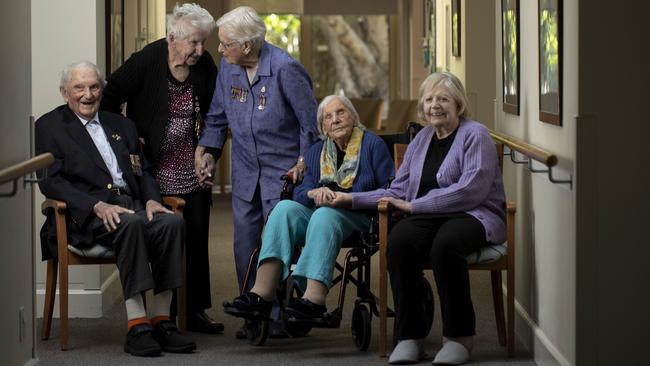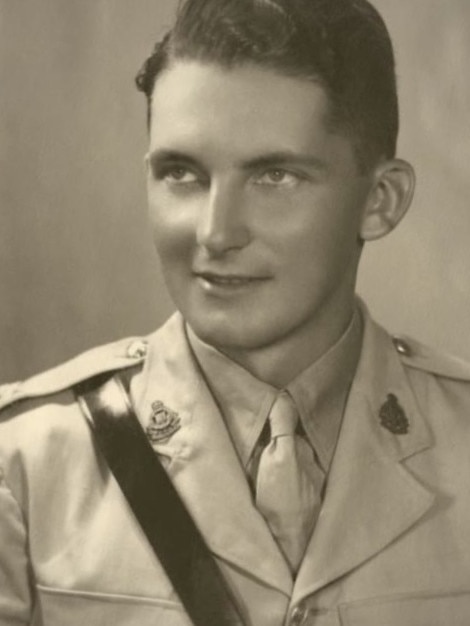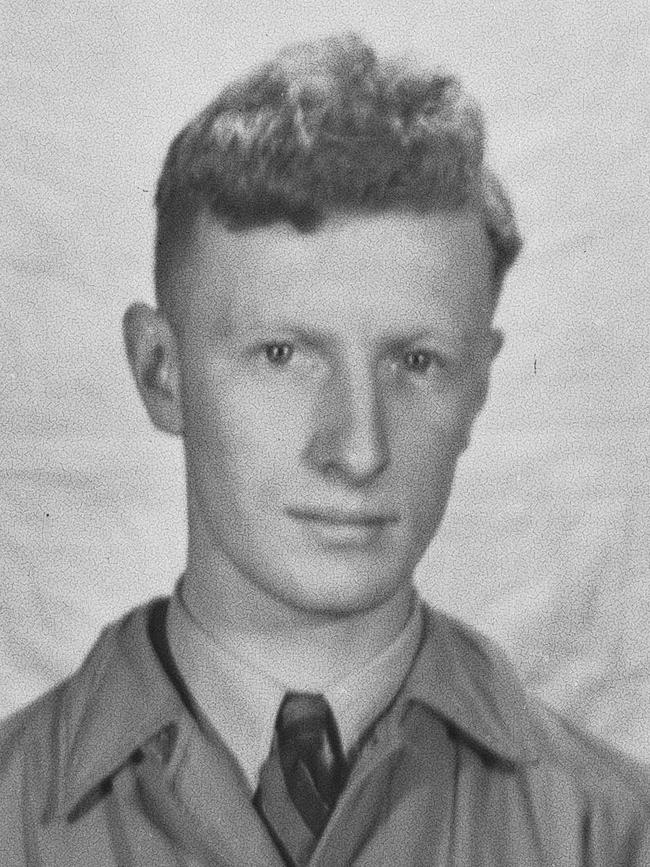Time waits for no man: mates bid sad farewell to two Bonza blokes Ralph Butcher and Frank Bristow
A ‘Bonza Bunch’ of World War II veterans lose two of its best as Ralph Butcher, 105, and Frank Bristow, 98, bow out.

And then there were four.
Ralph Butcher, 105, and still the life of any party, was one of six members of the “Bonza Bunch” of World War II veterans who took us into their confidence ahead of Anzac Day.
But time waits for no man, and the ebullient old army captain died this week at the residential care centre in Melbourne that’s home to the Bonzas, standard bearers of a great generation that is fading fast.
It was a double blow for the group, coming on top of the sad news that Frank Bristow, 98, had also slipped away on Tuesday.
“To have two go in the one day was a shock,” said regular visitor Lachlan Gaylard, who met the Bonzas through his work with the Rats of Tobruk Association.
To the end, Mr Butcher delighted in telling the story of how he had to enlist with the Poms, when all he wanted was a ticket home from London so he could fight for his country after war broke out in 1939.
But, no, the people at Australia House had said arranging the sea passage would take weeks, possibly months, and he was a young man in a hurry to do his bit.
He took their advice to instead volunteer for the British Army and, to his surprise, was selected for officer training. “I didn’t intend to end up there,” Mr Butcher recounted last month, in what turned out to be his final interview. “I was keen to get back to Australia, to get home … But when I went to Australia House they said it would take at least six weeks to get on a ship, and even then there was no guarantee, and it was probably better to enlist in the British Army.
“That’s exactly what I did.”

What a war he had. Leveraging his civilian experience studying ophthalmology, Mr Butcher went into the Royal Army Ordnance Corps and followed the frontline troops into the thick of the action in North Africa, Sicily and Italy.
His job was to scour captured or wrecked enemy equipment for prized items. The expertly engineered optical gun sights from German tanks were a priority.
Towards the end of WWII, he was being ferried to reoccupied Greece in a four-ship convoy when one of the other transports struck a sea mine and capsized. Mr Butcher was urging survivors clinging to the overturned hull to swim for it, when a mate said: “Ralph, they’re British, not Australian. They don’t know how.”

Like Mr Bristow, an RAAF man, he served in one way or another for the rest of his long life.
Mr Butcher struck up a lasting friendship with Bonza Bunch member Marie Laurenceson, 98 – who became a signal’s clerk in the RAAF at age 18 – when their paths crossed after the war at the Beaumaris Legacy Widows Club in Melbourne, which he had helped set up. Finding themselves in nearby rooms at Vasey RSL Care, Brighton, they would often catch up for breakfast. “Ralph was always a gentleman,” she said.
Mr Bristow was not up to joining the group last month, but was happy to talk from his bed. Not about his war service, though, deployed in combat zones in New Guinea and what’s now Indonesia as a recorder with the RAAF’s No.114 mobile fighter control unit. He was on hand for the May 1945 amphibious assault of Tarakan to recapture the vast Japanese-held island of Borneo in the largest seaborne operation ever mounted by Australian forces. “It was all a long time ago … Israel is more interesting at the moment,” he said.
Mrs Laurenceson and the other surviving Bonzas – former army nurse Betty Cooper, 100, former WAAAF Annie Overs, 101, and former WAAAF Audrey Baker, 97, who thinks it’s a shame the term “bonza” has fallen out of use – mourned the passing of their friends on Friday.
They’re among the last of a very special breed. Of the nearly one million Australians who served in WWII, just 2500 remain, according to the Department of Veterans’ Affairs. That will halve by the end of next year and is projected to dip below 800 in 2026.
As ever, an irascible Mr Butcher insisted on having the last word. He told his 74-year-old daughter, Jenny, last week: “I’m resigning from everything.”
“He just smiled his little smile and I said, ‘I know what you mean, Dad’,” she recalled.
Mr Butcher’s wife of 63 years, Chris, died in 2010, aged 91. He leaves Jenny and her sister, Sue, four grandchildren and one great-grandchild.




To join the conversation, please log in. Don't have an account? Register
Join the conversation, you are commenting as Logout